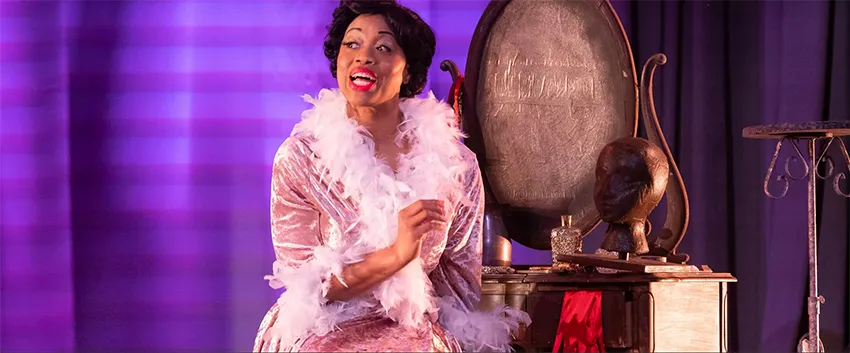Soprano talks historical significance of revolutionary icon
On October 30 in the Nordstrom Recital Hall, Music of Remembrance – a nonprofit classical chamber music organization with a focus on works composed by victims of the Holocaust – will host a performance of American composer Tom Cipullo's Josephine. It's an opera about Josephine Baker, the colorful and revolutionary Black performer who left a lasting mark on the arts, aided the French resistance in World War II, and was active in the American civil rights movement. She was also, as it turns out, Bisexual.

Starring in the title role is Laquita Mitchell, who took time out of her busy final day before her trip to Seattle to talk about the show and give some background. Mitchell has been singing opera professionally since 2005, and has performed Josephine for crowds in New Orleans and online for the Colorado Opera.
"The piece is about 40 minutes, but it's nonstop singing," Mitchell said of the show. It's presented like a one-sided interview, she said, with a silent journalist listening while Baker is "reminiscing about her life."
"This is a woman who has been performing since, what, 1921, and she passed in 1975," Mitchell said. At the time of the fictional interview, "she's been telling this story about her life, and about her singing, for 50 years. So you can imagine there might be embellishments."
Narrator reliability aside, the opera is far from fictional. It's based on a biography titled The Hungry Heart, written by Jean-Claude Baker, one of Josephine's twelve adopted children.
"She was just an amazing woman, who fought for the French resistance," Mitchell said. Baker used her fame as a performer to ferry information to England, such as German troop movements, airfields, and harbors.
Mitchell also described Baker as "a tortured sort of person, because of the trauma of what she experienced growing up in the United States." She spent her childhood in the slums of early 1900s St. Louis, witnessing the horrors of the race riots there in 1917, and suffering abuse from the white families she worked for.
"But what she left behind is this long legacy of movies, and writings, and books, and photos," Mitchell continued. "She really ushered in this thing of the Black person having to leave the United States. James Baldwin did it, Langston Hughes did it.... Everybody had to leave, if they wanted to do something with their lives."
To prepare for the role, Mitchell researched Baker thoroughly, all the way down to her mannerisms, although Baker had long been something of a household name for her. The more challenging parts of the opera, though, don't involve singing.
"As a singer, the talking is a bit difficult," Mitchell said of certain segments. "You just want to sing, you know? But you get used to it, and you deal with it, and you adapt – and you do your best to breathe in the essence of who [Baker] was."
Performing the piece is also emotionally taxing, since it hits so close to home. "It's a wonderful piece, but it brings up a lot of feelings as a person of color, because things may have changed for [Baker], but they have not really changed in this country," Mitchell said. "That feeling of marginalization, and that feeling of having to prove herself over and over and over again for fifty years – it's quite exhausting."
Though Baker's early career was in the vaudeville style, the opera is much more contemplative, meant to depict the performer later in life, when the days of her famous "Banana Dance" were long over.
"She was a Black woman, living in Paris, who had her own club. She had her own dancers, she had her own singers – she did whatever she wanted to do," Mitchell said. "And then there came many husbands, and there came this big, extravagant life." (Her son Jean-Claude wrote that she had relationships with women too, like blues singer Clara Smith.)
By most accounts, Baker seemed to have it all. She made friends with celebrities of all kinds, as well as fashion designers, directors, and musicians, who all wanted a part in what she was doing.
"But there was still this burning within her of the issues with being a person of color," Mitchell said, "and not having the rights that she felt her people deserved."
"We end the opera with her speaking at the March on Washington – the famous March on Washington, where Martin Luther King gives the 'I Have a Dream' speech," Mitchell said. Baker was the only woman to give a full, official speech at the event, in her Free French military uniform. Before that, she had also worked with the NAACP.
"She was one of our early, early, early freedom fighters, but she fought in a different way."
You can learn more about Josephine and buy tickets for the show at https://www.musicofremembrance.org/show-details/josephine/. It will be paired with the world premiere of "Wertheim Park" by Lori Laitman, a dramatic song weaving music and poetry together in a moving elegy for the Dutch Jews lost to the Holocaust, and chamber works by Holocaust-era composers Max Vredenburg and Erwin Schulhoff.


